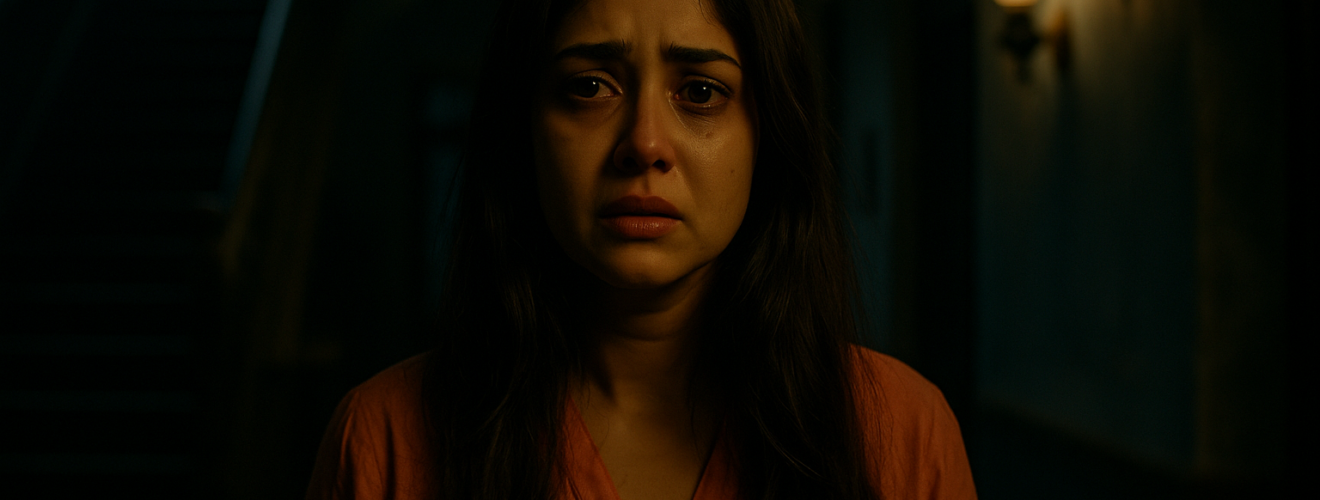Batshorik Movie Review: Grief Haunts the Halls of Horror

Batshorik, a Bengali psychological horror-thriller, premiered on June 6, 2025. Directed by Mainak Bhaumik, the film draws viewers into a slow-burning narrative that intertwines grief, guilt, and supernatural dread. The movie focuses on how unresolved emotional trauma can manifest as haunting presences, creating a story that operates on both literal and symbolic levels.
Box Office and Initial Reception
Batshorik opened to moderate box office numbers. Audience responses quickly trended across regional platforms, with ratings averaging around 8.4 out of 10. Viewers appreciated the film’s emotional core and atmospheric horror, although some critics expressed concern over its slow pacing. The Times of India rated it 3.5 out of 5, while other reviewers like IWM Buzz offered a more cautious 2.5 out of 5. Early feedback from BookMyShow indicated a polarized reaction, where one segment of the audience praised the emotional resonance and the other criticized the uneven execution.
Plot Summary
The story unfolds through Brishti, a young widow coping with the grief of her husband Nil’s untimely death. On the first anniversary of his passing—the traditional “Batshorik” ceremony—strange occurrences begin to unfold in their ancestral home. Swapna, Nil’s sister, suspects something more sinister at play and begins performing traditional rituals to cleanse the home of an evil spirit or “Pishach.”
As Brishti struggles with her mental stability, the house itself begins to feel sentient, as though it responds to the family’s emotional turbulence. The film builds tension not through gore or overt horror, but through atmosphere, unexplained noises, and a sense of something watching.
Performances
Ritabhari Chakraborty, who plays Brishti, delivers a nuanced performance. She portrays denial, sorrow, and eventual breakdown with emotional authenticity. Her body language and expressive eyes carry much of the film’s psychological weight. Satabdi Roy, in the role of Swapna, plays the role of a science-minded rationalist who slowly embraces traditional beliefs out of desperation. Her performance anchors the film in cultural authenticity.
Ishan Mazumder plays Nil, who appears in flashbacks and memory sequences. His calm presence contrasts with the emotional turmoil that Brishti and Swapna experience, adding emotional complexity to the unfolding narrative.
Direction and Screenplay
Mainak Bhaumik constructs the film with an intention to blur the lines between internal suffering and external horror. He uses grief not only as a plot device but as the foundation for horror. The screenplay favors symbolism and subtlety over exposition. The narrative doesn’t spoon-feed answers; instead, it lets the audience piece together what might be real or imagined.
Cinematography and Sound Design
The cinematography enhances the haunted atmosphere. Dim lighting, long hallway shots, and lingering close-ups on mundane objects transform the home into a character in itself. The color palette uses dull greys and browns, invoking decay and melancholy.
The sound design stands out as one of the film’s strongest elements. Soft whispers, creaking wood, distant knocks, and sudden silences build anxiety without relying on traditional jump scares. The background score blends seamlessly with ambient sounds, elevating the tension in key scenes.
Symbolism and Themes
Batshorik explores grief, guilt, and belief systems. Brishti’s psychological deterioration parallels the spiritual decline of the house. The rituals Swapna performs act not only as plot devices but also symbolize emotional catharsis. The act of burning Nil’s clothes becomes a metaphor for letting go.
The film repeatedly asks: what haunts us more—ghosts or our own memories? Bhaumik makes viewers confront their own discomfort with emotional vulnerability by portraying grief as something haunting, suffocating, and inescapable.
Pacing and Editing
The first half sets the mood with deliberate pacing, focusing on character development and emotional buildup. However, the second act slows down significantly. Scenes linger too long, and the central conflict sometimes feels diluted by repetitive imagery. The climax, however, rewards patient viewers with an emotionally powerful payoff that ties together the emotional and supernatural arcs.
Strengths
- Strong performances, especially by Ritabhari Chakraborty.
- Rich thematic layers that elevate it beyond standard horror fare.
- Excellent sound design that builds tension without clichés.
- Visually immersive cinematography.
- Culturally grounded storytelling with emotional depth.
Weaknesses
- Inconsistent pacing, especially in the middle act.
- Dialogues occasionally lack natural flow.
- Some performances, particularly supporting roles, lack depth.
- The subtle approach to horror may not satisfy fans of traditional scares.
Audience Reaction
Viewers responded with divided opinions. Many praised the film for its emotional resonance and mature storytelling. They saw it as a bold departure from typical horror formats. Others found it too slow and lacking in conventional thrills. The emotional core deeply resonated with viewers who had experienced personal loss.
Comparative Context
In the landscape of Bengali cinema, Batshorik offers a fresh take. While earlier films like “Bhooter Bhabishyat” approached horror with humor, Batshorik treats it with solemnity. It doesn’t aim to entertain but to unsettle. It belongs in the same conversation as international psychological horrors like “The Babadook” or “Hereditary,” which also explore grief as a central horror element.
Final Verdict
Batshorik succeeds when it focuses on emotional truth and atmospheric horror. It falters slightly when it stretches scenes beyond their purpose or tries too hard to maintain ambiguity. However, the film achieves something rare in regional cinema: it gives horror a heart.
Viewers who seek fast-paced, thrill-heavy horror may not connect with it. Those who appreciate layered narratives, emotional introspection, and psychological nuance will find Batshorik to be a rewarding experience.
Final Rating: 3.5/5
Mainak Bhaumik creates a film that haunts not just through spirits, but through sorrow, making Batshorik a memorable entry in modern Bengali cinema.













